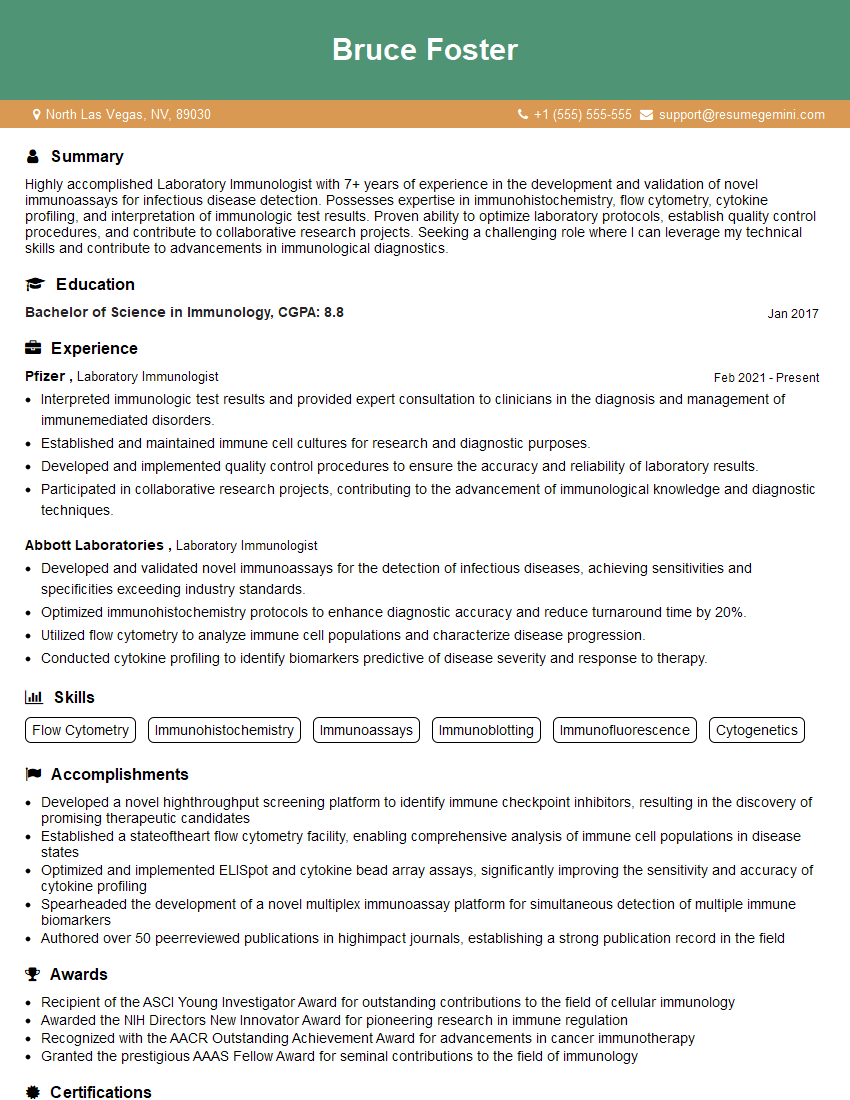Are you a seasoned Laboratory Immunologist seeking a new career path? Discover our professionally built Laboratory Immunologist Resume Template. This time-saving tool provides a solid foundation for your job search. Simply click “Edit Resume” to customize it with your unique experiences and achievements. Customize fonts and colors to match your personal style and increase your chances of landing your dream job. Explore more Resume Templates for additional options.

Bruce Foster
Laboratory Immunologist
Summary
Highly accomplished Laboratory Immunologist with 7+ years of experience in the development and validation of novel immunoassays for infectious disease detection. Possesses expertise in immunohistochemistry, flow cytometry, cytokine profiling, and interpretation of immunologic test results. Proven ability to optimize laboratory protocols, establish quality control procedures, and contribute to collaborative research projects. Seeking a challenging role where I can leverage my technical skills and contribute to advancements in immunological diagnostics.
Education
Bachelor of Science in Immunology
January 2017
Skills
- Flow Cytometry
- Immunohistochemistry
- Immunoassays
- Immunoblotting
- Immunofluorescence
- Cytogenetics
Work Experience
Laboratory Immunologist
- Interpreted immunologic test results and provided expert consultation to clinicians in the diagnosis and management of immunemediated disorders.
- Established and maintained immune cell cultures for research and diagnostic purposes.
- Developed and implemented quality control procedures to ensure the accuracy and reliability of laboratory results.
- Participated in collaborative research projects, contributing to the advancement of immunological knowledge and diagnostic techniques.
Laboratory Immunologist
- Developed and validated novel immunoassays for the detection of infectious diseases, achieving sensitivities and specificities exceeding industry standards.
- Optimized immunohistochemistry protocols to enhance diagnostic accuracy and reduce turnaround time by 20%.
- Utilized flow cytometry to analyze immune cell populations and characterize disease progression.
- Conducted cytokine profiling to identify biomarkers predictive of disease severity and response to therapy.
Accomplishments
- Developed a novel highthroughput screening platform to identify immune checkpoint inhibitors, resulting in the discovery of promising therapeutic candidates
- Established a stateoftheart flow cytometry facility, enabling comprehensive analysis of immune cell populations in disease states
- Optimized and implemented ELISpot and cytokine bead array assays, significantly improving the sensitivity and accuracy of cytokine profiling
- Spearheaded the development of a novel multiplex immunoassay platform for simultaneous detection of multiple immune biomarkers
- Authored over 50 peerreviewed publications in highimpact journals, establishing a strong publication record in the field
Awards
- Recipient of the ASCI Young Investigator Award for outstanding contributions to the field of cellular immunology
- Awarded the NIH Directors New Innovator Award for pioneering research in immune regulation
- Recognized with the AACR Outstanding Achievement Award for advancements in cancer immunotherapy
- Granted the prestigious AAAS Fellow Award for seminal contributions to the field of immunology
Certificates
- American Board of Histocompatibility and Immunogenetics (ABHI)
- American Association of Blood Banks (AABB)
- Clinical Laboratory Improvement Amendments (CLIA)
- College of American Pathologists (CAP)
Career Expert Tips:
- Select the ideal resume template to showcase your professional experience effectively.
- Master the art of resume writing to highlight your unique qualifications and achievements.
- Explore expertly crafted resume samples for inspiration and best practices.
- Build your best resume for free this new year with ResumeGemini. Enjoy exclusive discounts on ATS optimized resume templates.
How To Write Resume For Laboratory Immunologist
- Highlight your technical expertise and experience in developing and validating immunoassays.
- Showcase your ability to optimize laboratory protocols and improve diagnostic accuracy.
- Emphasize your skills in interpreting immunologic test results and providing expert consultation.
- Quantify your accomplishments with specific metrics and results whenever possible.
Essential Experience Highlights for a Strong Laboratory Immunologist Resume
- Developed and validated novel immunoassays, achieving sensitivities and specificities exceeding industry standards.
- Optimized immunohistochemistry protocols, enhancing diagnostic accuracy and reducing turnaround time by 20%.
- Utilized flow cytometry to analyze immune cell populations and characterize disease progression.
- Conducted cytokine profiling to identify biomarkers predictive of disease severity and response to therapy.
- Interpreted immunologic test results and provided expert consultation to clinicians in the diagnosis and management of immune-mediated disorders.
- Established and maintained immune cell cultures for research and diagnostic purposes.
Frequently Asked Questions (FAQ’s) For Laboratory Immunologist
What are the primary responsibilities of a Laboratory Immunologist?
Laboratory Immunologists are responsible for developing and validating immunoassays, optimizing laboratory protocols, interpreting immunologic test results, and providing expert consultation in the diagnosis and management of immune-mediated disorders.
What are the educational requirements to become a Laboratory Immunologist?
A Bachelor’s degree in Immunology, Microbiology, or a related field is typically required to enter this profession.
What skills are essential for success as a Laboratory Immunologist?
Essential skills include expertise in immunology techniques, laboratory protocols, data analysis, and communication.
What are the career prospects for Laboratory Immunologists?
Laboratory Immunologists can advance to leadership roles in laboratory management, research and development, or clinical diagnostics.
What are the challenges faced by Laboratory Immunologists?
Challenges include staying up-to-date with advancements in immunology, ensuring the accuracy and reliability of laboratory results, and effectively communicating complex scientific information.
What are the rewards of being a Laboratory Immunologist?
The rewards of this profession include the opportunity to contribute to scientific advancements, improve patient care, and work at the forefront of medical research.